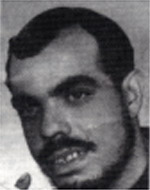Ohana, Shlomo
Son of Rivka and Nissim, was born in 1943 in Morocco. At the age of seven he immigrated with his parents to Israel and in 1952 the family settled in Jerusalem. He completed his elementary studies and went to work to help support the family. He worked as a laborer, an ironman, but his work was erratic. In July 1960 he enlisted in the IDF and after two years of service in July 1962 he was discharged as a non-professional worker with limited education, until he underwent a first class cookery course at the Tadmor Hotel in Herzliya. In 1968, he began working at the King David Hotel in Jerusalem, where he was assigned to serve in the reserves as a professional cook, and in November 1972 he married and built his home in Jerusalem. He began serving in the regular army in October 1973 and immediately rose to the rank of sergeant and was sent to a series of courses, including courses Expand education and completion, as well as senior military course as a cook. October 1974 rose to the rank of sergeant. His commander at the time expressed his opinion of him: “A quiet soldier, very disciplined, with a high level of professionalism, a lot of work, knowledge and good will, does a good job as an excellent professional.” His family grew. He had sons and daughters, but in 1982 a disaster struck his family. One of his sons was killed in a car accident. Shlomo continued his work at the IAF base and was part of the basic experience, loved by all and succeeded in his profession. On Saturday, 8.8.1982, while on duty at the base, he went with a group of friends to swim in the pool at the base. He froliced, jumped from height to shallow water, and was severely wounded in the head. On September 26, 1982, he died of his wounds, when he died at the age of 39. He was buried in the Mount Herzl Military Cemetery in Jerusalem and left behind a wife, three sons, three daughters, a mother, brothers and sisters. His unit to his family was said: “Shlomo was above him and performed his duties with dedication. Was loved by his subordinates. “Shlomo’s memory was commemorated in the synagogue on the military base where he served
